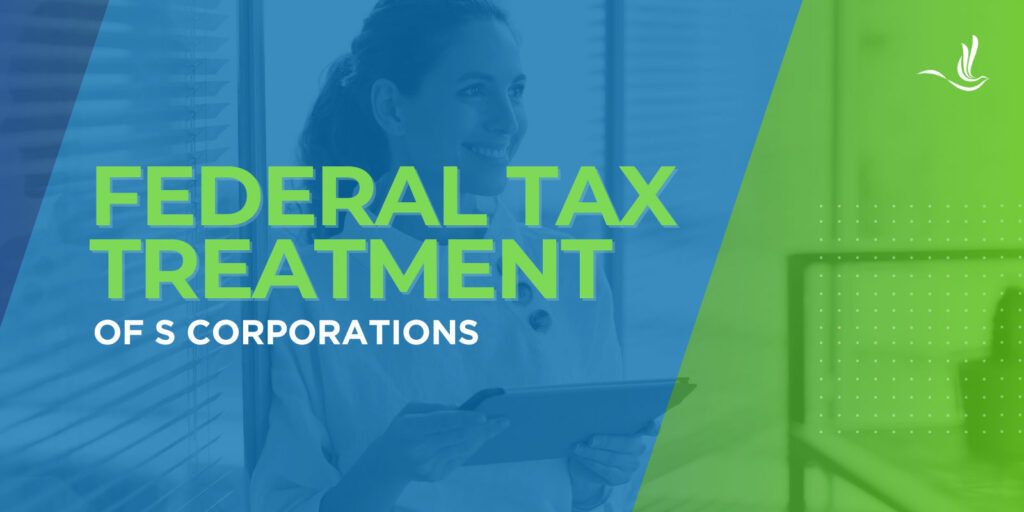Federal Tax Treatment of S Corporations

S Corporations (S Corps) are a popular business structure that combines the limited liability features of a corporation with the pass-through taxation of a partnership. This unique structure provides owners, also known as shareholders, with certain tax advantages compared to traditional C Corporations. In this article, we will explore the intricacies of the federal tax treatment of S-Corps.
What Are S Corporations?
S Corps are a specific type of business entity that combines the limited liability protection of a corporation with the pass-through taxation of a partnership or sole proprietorship. This business structure is named after Subchapter S of the Internal Revenue Code, which outlines the rules governing S Corporations. In addition to limited liability and pass-through taxation, the main features of an S Corp include owner restrictions and a single class of stock.
Election and Eligibility
To be taxed as an S Corporation, a business must first qualify and elect to be treated as such by filing Form 2553, Election by a Small Business Corporation, with the IRS. There are strict eligibility criteria, including having no more than 100 shareholders, all of whom must be individuals, estates, certain trusts, or tax-exempt organizations. Shareholders cannot include partnerships, corporations, or non-resident aliens. Additionally, the corporation must be a domestic entity and cannot have multiple classes of stock. Finally, the corporation must not be an ineligible corporation, such as a financial institution, insurance company, or domestic international sales corporation.
Pass-Through Taxation
One of the primary advantages of S Corporations is their pass-through taxation. This means that the corporation itself does not pay income taxes, like a C Corporation. Instead, the profits and losses “pass through” to the individual shareholders, who report this income on their personal tax returns. This helps avoid the double taxation that C Corporations face, where both the corporation and the shareholders are taxed on profits. However, this may vary depending on which state you do business in.
To file a tax return for an S Corporation, use Form 1120-S, U.S. Income Tax Return for an S Corporation. S-Corp tax returns are due on the 15th day of the third month after the corporation’s tax year. Businesses should submit Form 1120-S with Schedule K-1, Partner’s Share of Income, Deductions, Credits, etc. A Schedule K-1 form is needed for each individual shareholder to report their own individual profit and loss for the year. Shareholders of S Corporations then report their share of the corporation’s income on their personal tax returns. This income is subject to individual income tax rates. Unlike traditional employees, shareholders are also required to pay self-employment tax on their share of the S Corporation’s net income. This tax covers Social Security and Medicare taxes.
Distributions and Tax Consequences
When a company elects S Corp status, members are classified as employees and collect a salary. One of the biggest advantages that S Corporations has over a partnership is that it can distribute profits to shareholders in the form of dividends or distributions. Unlike a typical salary, distributions are not subject to the 15.3% self-employment tax. For example, let’s say a shareholder is paid a $50,000 salary and another $20,000 in dividends. Only the $50,000 would be subject to self-employment taxes, while the dividends are subject to regular income tax. Note that the IRS may view low salaries and high distributions as a method of avoiding taxes. Shareholders should keep this in mind when taking distributions.
Non-Compliance
Maintaining compliance with relevant laws and regulations is crucial for the smooth operation of any business entity, including S Corporations. If an S Corporation fails to remain compliant, it may face various consequences. The IRS may impose penalties and interest for late or inaccurate filings. If an S Corp does not follow the IRS’s strict guidelines, it can revoke S Corporation status. To avoid these potential consequences, S Corporations should stay informed about relevant laws and regulations, maintain accurate financial records, and fulfill their filing and reporting obligations.
Tax Help for S Corporations
Understanding how S Corporations are taxed is crucial for shareholders looking to make informed financial decisions. The combination of pass-through taxation, limited liability, and potential tax benefits makes the S Corporation an attractive option for many small to mid-sized businesses. However, navigating the complexities of S Corporation taxation requires careful consideration and often the assistance of tax professionals to ensure compliance with tax laws and optimization of financial outcomes. Optima Tax Relief is the nation’s leading tax resolution firm with over a decade of experience helping taxpayers with tough tax situations.
If You Need Tax Help, Contact Us Today for a Free Consultation